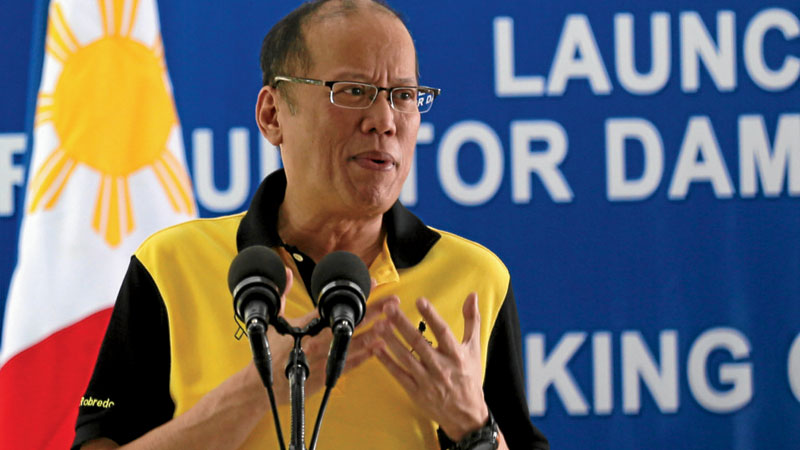
President Aquino deliver his speech during the launching of the Angat afterbay Regulatory dam (Bustos Dam) Rehibalitation project in Brgy Tibagan, Bustos Bulacan. INQUIRER PHOTO/JOAN BONDOC
PUBLIC satisfaction with President Aquino in Metro Manila plunged to a “neutral” zero rating in the first quarter, a new record low in the metropolis and a steep dive from the end of last year, from the “moderate” in the previous quarter, according to the latest Social Weather Stations (SWS) survey.
The survey also showed the President’s overall rating slid from “good” to “moderate.”
Among respondents in the nation’s capital, 43 percent were satisfied while 44 percent were dissatisfied with Mr. Aquino’s performance, resulting in a net satisfaction rating (satisfied minus dissatisfied) of a “neutral” zero in April, a downgrade from the previous quarter’s “moderate” +23 (55 percent satisfied minus 31 percent dissatisfied).
Overall, 57 percent were satisfied with the President’s performance while 30 percent were dissatisfied, for a net satisfaction rating of “moderate” +27 in the first quarter, down by 5 points from the “good” +32 (58 percent satisfied minus 26 percent dissatisfied) in December.
The SWS said the five-point dip in his rating was due to “declines of 23 points in Metro Manila, eight points in the Visayas, and one point in Mindanao, combined with a steady score in the Balance Luzon.”
But Malacañang insisted Monday that President Aquino’s latest public satisfaction rating was “still high” even if it was the lowest since the first quarter last year.
“Overall rating (+27) was still high for a president who is completing the last semester of his term,” Communications Secretary Herminio Coloma Jr. said in reaction to the latest SWS survey.
Coloma said the President, who is stepping down on June 30, was “grateful for the people’s unstinting trust in his leadership.”
The President also suffered a double-digit decline among classes ABC, from a net rating of “good” +44 in December to “moderate” +17.
SWS considers a rating of plus 70 and above as “excellent”; plus 50 to plus 69, “very good”; plus 30 to plus 49, “good”; plus 10 to plus 29, “moderate”; plus 9 to minus 9, “neutral”; minus 10 to minus 29, “poor”; minus 30 to minus 49, “bad”; minus 50 to minus 69, “very bad”; minus 70 and below, “execrable.”
The survey, conducted from March 30 to April 2, interviewed 1,500 respondents nationwide and had a margin error of plus-or-minus 3 percentage points. It was first published in BusinessWorld Monday.
Lowest since Mamasapano
The latest overall net satisfaction rating was the lowest since the +11 in March last year following the Jan. 25 clash between Philippine National Police Special Action Force (SAF) commandos and Moro rebels in Mamasapano, Maguindanao. Forty-four SAF troopers, 17 Moro Islamic Liberation Front fighters and three civilians were killed during the encounter.
But when compared with his predecessor, Gloria Macapagal-Arroyo, Mr. Aquino scored better. Arroyo received a “very bad” -53 net satisfaction rating in March 2010 and a “poor” -17 in June 2010.
In the Visayas, the President’s net satisfaction rating remained “good” but fell by 8 points between December and April, from +58 to +50. It was unchanged at “moderate” +23 in Luzon outside Metro Manila and barely moved in Mindanao at “good” +30 in the first quarter, from a still “good” +31 at the end of 2015.
By locale, net scores decreased in urban areas by 6 points, from “moderate” +19 in December to “moderate” +13 in April. It was the same in rural areas at “good” +37.
The President’s net rating was also down among class E, from +45 to +36, although both scores were still considered “good.” Among class D, his net rating was considered “moderate” but dropped from +28 to +25.
Among males, it dipped from a “good” +30 to a “moderate” +22, while among females it stayed “good” but fell by 2 points from +33 to +31.
Asked to comment on the President’s neutral zero rating in Metro Manila, Coloma first noted that Mr. Aquino “always governed on the basis of what is good for the country.”
“When there are marked disparities in regional survey ratings, then such differences are analyzed further,” Coloma said in a text message.
He noted that there were “similar significant drops in ratings” based on available data from previous SWS surveys but he pointed out the ratings “improved again in subsequent periods in response to government actions to address the concerns of the people.” Inquirer Research with a report by Christine O. Avendaño